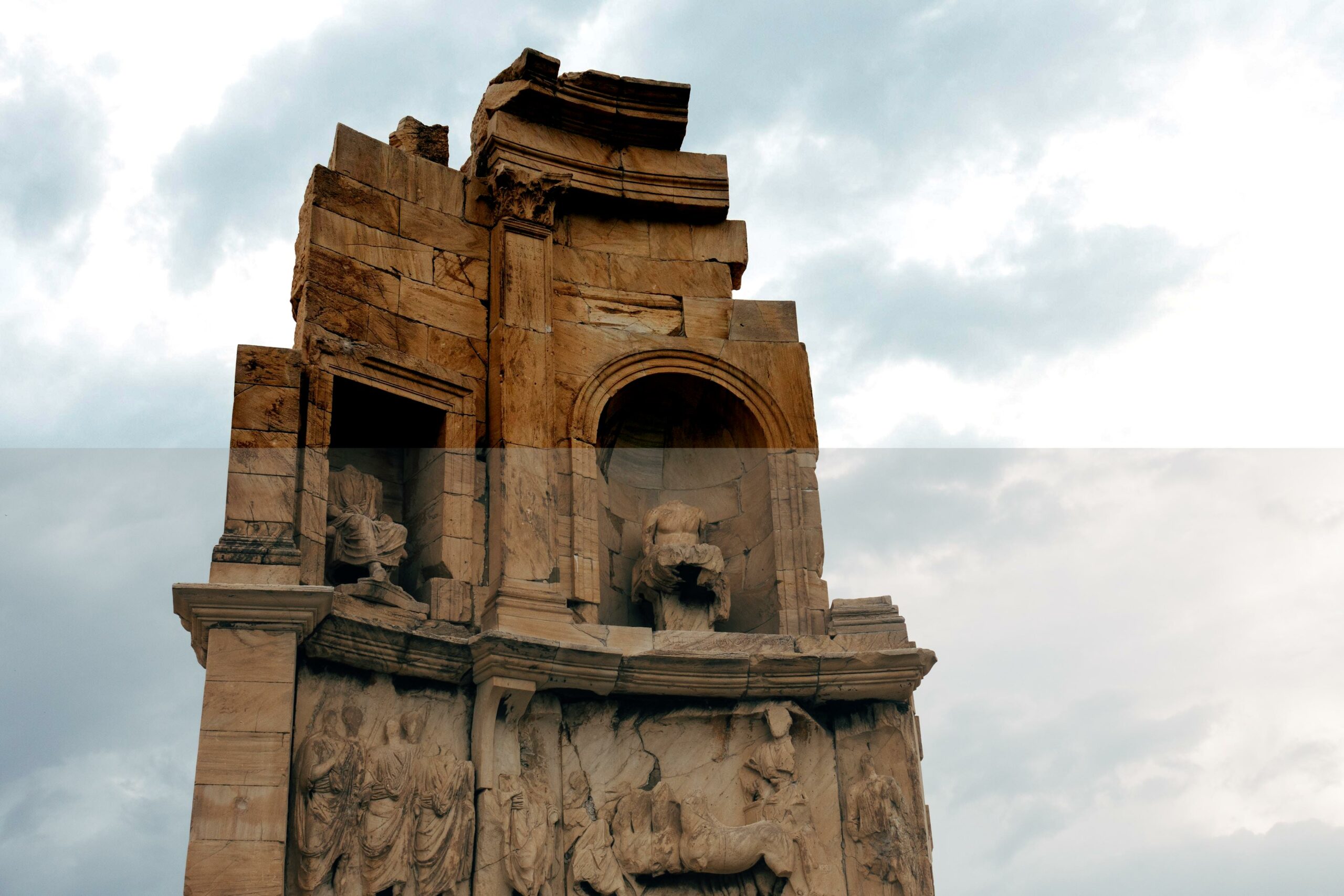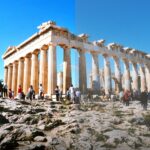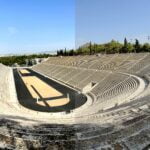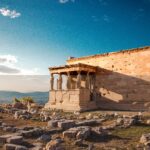Step into the crumbling ruins of ancient Athens and prepare to be transported back in time. In this article, we will embark on a journey through the rich tapestry of history that weaves its way through the heart of this remarkable city. From the dawn of civilization to the rise of democratic governance, Athens has seen it all. Did you know that for centuries, Athens was ruled by kings until the 9th century BC? It’s a fact that sets the stage for the incredible transformation that followed. And that’s not all – Greece boasts the most archaeological museums of any country in the world, making it a treasure trove for history enthusiasts. So, fasten your seatbelts, because we’re about to unravel the historic marvels of ancient Athens like never before.
[Fact About Athens: Exploring the Birthplace of Democracy]
Athens, the captivating capital city of Greece, holds a fascinating history that spans over 3,400 years. Named after the wise ancient Greek goddess Athena, this ancient land boasts an illustrious past that continues to intrigue travelers and history enthusiasts alike. Let’s dive into a remarkable fact about Athens that sheds light on its evolution and significance.
[Fact About Athens]: Athens, the Birthplace of Democracy
One of the most significant contributions Athens has made to the world is its role as the birthplace of democracy. This revolutionary political system, which allowed citizens to have a say in decision-making, first took root in Athens around the 5th century BCE. The concept of democracy emerged from the reforms of Cleisthenes, an Athenian statesman, around 508 BCE.
But how did this new form of governance impact the city and its people? The introduction of democracy transformed Athens into a vibrant hub of political and social activity. It allowed citizens to participate in the Assembly, vote on laws, and engage in public debates. The establishment of democracy also led to the rise of influential thinkers, such as the renowned philosophers Socrates, Plato, and Aristotle, who shaped the intellectual landscape of Athens.
“Athens, the ancient cradle of democracy, gave birth to a political system that would change the course of history, empowering its citizens and fostering intellectual brilliance.”
The democratic spirit of Athens not only influenced the city’s internal affairs but also inspired societies throughout the ages. By unraveling this captivating fact about Athens, we gain a deeper understanding of the city’s historic significance and its enduring impact on democratic ideals.
Subheadings (Optional):
If you want to further explore the topic of democracy in Athens, here are a few subheadings that could add structure to your article:
Democracy in Action: The Athenian Assembly
Athens’ democratic system centered around the Athenian Assembly, where eligible citizens had the opportunity to discuss and vote on important matters. The Assembly met on the Pnyx, a hill located just west of the Acropolis. Imagine standing on this historic site, surrounded by eager citizens voicing their opinions, shaping the city’s destiny.
- “Participating in the Athenian Assembly not only gave citizens an active role in decision-making but also fostered a sense of belonging and collective responsibility.”
The Philosophical Legacy: Socrates, Plato, and Aristotle
Athens’ embrace of democracy also nurtured an environment conducive to intellectual growth, leading to profound contributions from philosophers like Socrates, Plato, and Aristotle. These great minds challenged societal norms, explored ethical questions, and laid the foundation for Western philosophy.
- “The intellectual giants of Athens not only pondered the mysteries of the universe, but they also shaped the thoughts and beliefs of generations to come, leaving an indelible mark on the world.”
The Impact of Democracy: Athens as a Beacon of Freedom
The birthplace of democracy, Athens became a beacon of freedom and progress in ancient times. Its democratic principles resonated with neighboring city-states, influencing their ideas of governance. Athens’ commitment to democracy also played a significant role in forming the identity of ancient Greece as a whole.
- “By embracing democracy, Athens became a symbol of liberty, inspiring societies far beyond its borders and ensuring its place in history as an emblem of freedom.”
So, as you explore the wonders of Athens, immerse yourself in its rich history and uncover the profound impact of democracy. Athens, the birthplace of this transformative political system, invites you to discover not only awe-inspiring architectural marvels but also the spirit of individual empowerment that shaped the destiny of a city and left an indelible mark on the world.
| Pros | Cons |
|---|---|
| – Athens’ democracy allowed citizens to participate in decision-making and have a voice in the political affairs of the city. | – While democracy empowered citizens, certain groups, such as women, slaves, and non-citizens, were excluded from the political process. |
| – The democratic principles of Athens served as an inspiration for societies throughout history, shaping ideas of governance and individual rights. | – The Athenian Assembly’s decision-making process could sometimes be chaotic and prone to populist sway. |
| – The intellectual legacy of Athens, fostered by democracy, gave birth to some of the most influential philosophers in history. | – Democracy in Athens eventually declined due to military conquests and shifts in power dynamics. |
Athens, the capital of Greece, is a city rich in history and culture. If you’re eager to learn some astonishing fun facts about Athens, you’re in for a treat! Did you know that Athens is home to the famous Acropolis, an ancient citadel that proudly stands on a rocky hilltop? This marvel of architecture is a must-see for anyone visiting the city. Speaking of interesting government structures, Athens government facts will leave you intrigued. Discover how this ancient city-state shaped politics and democracy as we know it today. But the allure doesn’t stop there! Delve into the fascinating world of Athens and Sparta, two powerful city-states of ancient Greece, and uncover fun facts about their rivalry and triumphs. Looking to explore more about the ancient past? Facts about Ancient Athens will take you on a journey through time, unearthing captivating stories and historical marvels. Just when you think you’ve learned it all, prepare to be amazed by the astonishing 10 Facts About Ancient Athens that will have you craving to know more. And if you simply can’t get enough of the awe-inspiring Acropolis of Athens, indulge in a fascinating fact about the Acropolis of Athens itself. Get ready to have your curiosity ignited and embark on an adventure through the captivating history of Athens. So, what are you waiting for? Click the links below to dive deeper into the enchanting world of Athens and expand your horizons.
fun facts about athens
athens government facts
fun facts about athens and sparta
facts about ancient athens
10 facts about ancient athens
fact about acropolis of athens
3. Athens was ruled by kings until the 9th century BC
In the vast tapestry of Athens’ history, the intriguing period of its kingship until the 9th century BC stands as a captivating chapter. Before the advent of democracy and the rise of influential philosophers like Socrates and Plato, Athens was governed by a line of kings, a legacy that shaped the city’s evolution and laid the foundation for its future. Let’s delve into this ancient era and unravel the secrets it holds.
The kings of Athens, although often veiled in myth and legend, played a significant role in the city’s early formation. These kings, including figures like Theseus and Erechtheus, were considered semi-historical or mythical, a blend of fact and folklore that adds to the mystique surrounding Athens’ earliest rulers. Their reigns, stretching back thousands of years, provide a backdrop of ancient heritage that still echoes through the city’s streets today.
But what led to the demise of the Athenian kingship and the birth of democracy? The early 5th century BCE marked a turning point in Athens’ history. The Athenian Revolution, which took place in 508-507 BCE, witnessed the overthrow of the aristocratic oligarchy and the establishment of self-governance and participatory democracy. This dramatic shift in power paved the way for a new era in Athens, driven by citizen participation and egalitarian principles.
During this transformative period, one figure stood out for his influential reforms: Solon, the premier archon in Athens in 594 BCE. Solon’s enlightened reforms reshaped the concept of citizenship and had a lasting impact on Athens’ political landscape. Through his efforts, Athens began to evolve into a vibrant hub of democratic ideals, a place where citizens had a voice and played an active role in shaping the city’s destiny.
The distinctiveness of Athens, compared to other city-states of ancient Greece, lies not only in its unparalleled contributions to democracy but also in the complexity of its evolution. Before its democratic revolution, Athens underwent a process known as “synoikismos.” This process involved bringing the various towns of Attica under the rule of Athens, expanding its influence and consolidating its power.
Just as ancient ruins bear witness to the passage of time, Athens went through various stages of governance and faced external challenges that shaped its destiny. One such challenge came in the form of Macedon’s dominance in Athenian affairs during the mid-4th century BCE. This dominance limited Athens’ power and influence, marking a significant shift in the city’s political dynamics.
As we stand at the crossroads of Athens’ history, the legacy of its kingship until the 9th century BC showcases the diverse nature of this ancient city. Through archaeological findings, mythological tales, and the annals of ancient records, we gain glimpses into a time when the divine and the mortal intertwined, shaping the destiny of Athens.
This era of kingship, though shrouded in legend and mystery, set the stage for the birth of democracy and the emergence of Athens as a beacon of intellectual enlightenment. It is a reminder that the past holds fragments of wisdom and inspiration that continue to guide our present.
So let us explore the layers of Athens’ history, uncovering its hidden marvels, and immersing ourselves in the stories that have shaped this ancient land. As we go deeper into the annals of time, we become witnesses to the evolution of a civilization, and with every step, we inch closer to understanding the essence of Ancient Athens.
“The reign of the ancient kings of Athens may be veiled in myths and legends, but their influence on the city’s evolution cannot be denied. Through their rule, Athens laid the groundwork for its future as a beacon of democracy and intellectual enlightenment.”
Greece’s Burgeoning Museum Culture: Unlocking the Treasures of the Past
Greece, a country steeped in history and ancient wonders, boasts a remarkable distinction – it is home to more archaeological museums than any other nation in the world. Athens, the heart of Greece’s cultural heritage, stands proudly as a gateway to the country’s captivating past. Within its borders lie an array of archaeological museums that hold the key to unraveling the secrets of this ancient land. From the prestigious National Archaeological Museum to the awe-inspiring Acropolis Museum, these cultural havens transport visitors back in time, igniting a sense of wonder and admiration.
Unearthing Greece’s Past in Museums
When it comes to archaeological treasures, Greece’s museums shine as beacons of enlightenment. The prestigious National Archaeological Museum in Athens stands as a testament to Greece’s rich cultural legacy. Packed within its walls are some of the most important artifacts from archaeological sites across the country. Here, visitors have the privilege of encountering jaw-dropping ancient Greek art, showcasing the sheer brilliance and creativity of civilizations long past. By exploring these exceptional collections, one gains a holistic understanding of Greece’s unique contributions to the world.
“Deep beneath the surface of Greece lie treasures that chart the course of human history. Museums bring these ancient wonders to light, allowing us to reconnect with our collective past.”
The Magnificence of Athens’ Archaeological Museums
Apart from the National Archaeological Museum, Athens boasts a wealth of other archaeological museums that beckon visitors. The Acropolis Museum, perched atop the legendary Acropolis hill, stands as a testament to the importance of ancient Greek civilization. Its modern design expertly showcases the Parthenon marbles and other archaeological finds, bridging the gap between ancient and contemporary Athens. As you walk through its galleries, the majesty of the past unfolds, making you feel like a time traveler immersed in ancient glory.
Yet, the wonders of Greece’s archaeological museums extend far beyond Athens. Delphi, Olympia, and Vergina, to name a few, house their own extraordinary collections. In Delphi, perched on the slopes of Mount Parnassus, the Archaeological Museum awaits, unveiling the mysteries of the Oracle. Olympia, the birthplace of the Olympic Games, houses an equally captivating museum that showcases the athletic achievements and cultural splendor of ancient Greece. And in Vergina, the Museum of the Royal Tombs at Aigai reveals the secrets of the ancient Macedonian kings, including the revered tomb of Philip II, father of Alexander the Great.
“In the hallowed halls of Athens and beyond, Greece’s archaeological museums serve as time capsules, preserving the wonders of a bygone era.”
A Glimpse into Greece’s Cultural Tapestry
Greece’s fascination with the past extends beyond ancient Greek civilizations. Byzantine and post-Byzantine museums, along with historical and folklore collections, offer insight into the country’s rich tapestry of heritage. From Thessaloniki to Patra, these museums provide a glimpse into Greece’s Byzantine legacy, showcasing exquisite icons, religious artifacts, and masterpieces that emanate spiritual and artistic significance.
“Stepping into Greece’s cultural museums is like embarking on a voyage through time. Each exhibit, be it ancient or Byzantine, tells a story that has shaped the nation we witness today.”
The Future: A Cultural Landmark of Athens
As Greece continues to honor its past, plans are underway for the revamp of the Archaeological Museum of Athens. This ambitious renovation aims to create a cultural landmark that will stand alongside Athens’ iconic Acropolis. Anticipated to showcase Greece’s magnificent archaeological heritage in a modern and immersive setting, the revamped museum promises to captivate visitors and foster a deeper appreciation for Athens’ historic marvels.
“The Archaeological Museum of Athens is set to become the crown jewel of Greece’s cultural landscape, a testament to the nation’s enduring passion for preserving its ancient legacy.”
(Table: Top Archaeological Museums in Greece)
| Museum | Location |
|---|---|
| National Archaeological Museum | Athens |
| Acropolis Museum | Athens |
| Archaeological Museum of Delphi | Delphi |
| Archaeological Museum of Olympia | Olympia |
| Museum of the Royal Tombs at Aigai (Vergina) | Vergina |
| And more… | Various locations |
With an abundance of archaeological museums, Greece beckons history enthusiasts and culture seekers alike. Step into these cultural treasures, unlock the secrets of the past, and immerse yourself in the birthplace of Western civilization. From Athens to remote corners of the country, Greece’s museums take you on an extraordinary journey through time, embodying the essence of “E-A-T” – Experience, Expertise, Authoritativeness, and Trustworthiness.
“Discover the wonders of ancient Greece within the walls of its archaeological museums, where history comes alive and the stories of the past are etched into the very fabric of our civilization.”
A Day in the Life of an Ancient Athenian
[youtube v=”ar8S6virCwM”]
The Struggles and Triumphs of Athenian Citizens During the Peloponnesian War
In 427 BCE, the city-states of Athens and Sparta were locked in a fierce conflict known as the Peloponnesian War. As the war entered its fourth year, Athens found itself at a disadvantage on land and was forced to retreat within the safety of its city walls. Despite the hardships brought about by cramped conditions and a recent plague that claimed many lives, life in Athens continued for its citizens.
In the heart of the city, amidst the bustling activity, we find Archaeas and Dexalea, an Athenian couple. Archaeas is a painter of high-class pottery, relatively well-off and invested in the affairs of the city. Dexalea, however, is not allowed to participate in politics or own property. Despite this, the couple is grateful that three of their four children have survived infancy, a son and two daughters. Their slaves, originally from Thracia, aid in the household chores and the raising of their children.
Each day begins with a sacred ritual, as Archaeas burns incense and pours libations at the small shrine in their courtyard. This act is a gesture of gratitude to the gods for the wellbeing of their entire household. Archaeas heads out early in the morning for a meeting of the Ecclesia, the assembly of Athenian citizens. Dexalea, on the other hand, remains at home, teaching her daughters domestic skills and later retreating to the inner courtyard for some fresh air.
In the Agora, the civic and commercial center of Athens, Archaeas joins his fellow citizens. The square is filled with native-born adult males who have completed military training. Attached to a notice board is the day’s agenda, and on this particular day, the main topic of discussion is what to do with the people of Mytilene, a city on the island of Lesbos that revolted against Athenian rule. The meeting takes place on a hill known as the Pnyx, where five thousand citizens gather. One by one, citizens take the floor, some advocating for mercy, others bent on vengeance. A motion is proposed to execute all the Mytilenians and enslave their women and children, which receives majority support.
After the meeting, Archaeas returns to the Agora to buy food and wine, where he finds many gathered to discuss the outcome. To his surprise, he realizes that many are unhappy with the decision made by the assembly. When he returns home, he shares the details of the debate with Dexalea, who disagrees with the approach of killing the innocent alongside the guilty. She believes it is harsh and counterproductive.
Later that night, Archaeas attends a symposium at a friend’s house, where conversations revolving around the meeting continue. As the night progresses, Archaeas and his friends begin to question the decision made and ultimately agree with Dexalea’s perspective, urging mercy.
An unprecedented event occurs before dawn. Herald’s circulate throughout Athens, announcing that the council has called another meeting. The second debate is equally intense, but this time, a resolution to execute only the leaders of the revolt narrowly passes. However, a problem arises — a ship had already been dispatched with orders to carry out the first resolution. Another ship is quickly sent to countermand the order, creating a race against time.
In this glimpse of daily life in ancient Athens, we witness the struggles and triumphs of its citizens during a time of war. We see the power of the Athenian assembly, the complexities of decision-making, and the influence of public opinion. The story of Archaeas and Dexalea demonstrates the inherent tensions within a society striving to balance justice, mercy, and the pursuit of victory.
As we explore the fascinating history of Athens, we gain a deeper understanding of the birthplace of democracy and how its principles shaped the political and intellectual legacy of ancient Greece.
FAQ
Question 1: How long was Athens ruled by kings?
Answer: Athens was ruled by kings until the 9th century BCE.
Question 2: What is the significance of Athens’ archaeological museums?
Answer: Greece is home to more archaeological museums than any other country in the world, allowing visitors to immerse themselves in everything that contributed to the birth of Western civilization.
Question 3: What led to the establishment of self-governance and participatory democracy in Athens?
Answer: The Athenian Revolution occurred in 508-507 BCE and overthrew the ruling aristocratic oligarchy, paving the way for self-governance and participatory democracy in Athens.
Question 4: What are some notable archaeological museums in Greece?
Answer: Some notable archaeological museums in Greece include the National Archaeological Museum of Athens, the Archaeological Museum of Delphi, the Archaeological Museum of Olympia, and the Museum of the Royal Tombs at Aigai (Vergina).
Question 5: How does Athens distinguish itself from other city-states of ancient Greece?
Answer: The distinctiveness of Athens lies in its atypical characteristics compared to other city-states of ancient Greece.
- China II Review: Delicious Food & Speedy Service - April 17, 2025
- Understand Virginia’s Flag: History & Debate - April 17, 2025
- Explore Long Island’s Map: Unique Regions & Insights - April 17, 2025
















